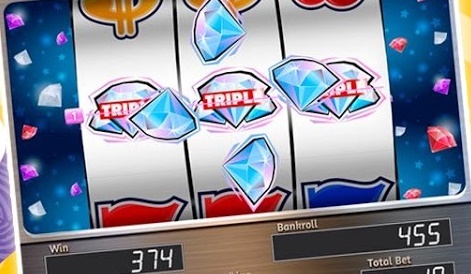Torulf Jernström is CEO of Finnish developer Tribeflame.
His blog is Pocket Philosopher.
You can read all his weekly PocketGamer.biz columns here.
This time, it’s about why casino games work, and what game developers for other genres can learn from them.
The casino category on the App Store was frankly puzzling to me for a long time. Why on earth would anyone spend real money to buy online credits in pointless games with no way to win any real money back?
In addition to this, the games often have quite confusing UIs where it is hard to tell what is going on.
Lately, we've done some work for a casino company. Up here in the Nordic countries, they are state run monopolies giving their profits to charities.
To deliver on their mission, they tasked us with the aim of broadening the player base - rather than getting more from the “whales”.
As part of it, I did some research into the psychology of slot machines. I highly recommend the book Addiction by Design by Natasha Dow Schüll as a resource for understanding these machines.
Casino game design
Let’s dig into how and why slot machines work and how that is relevant for other mobile games.
The first thing to realise is that the possibility of winning real money is only the hook that leads to the initial interest for these machines.
Once the players get into the habit of playing, it’s not really about winning anymore. It’s about staying in the zone - in this case it’s actually called the “Machine Zone”. (That might have been the inspiration for naming a well known game developer).

It might come as a surprise to some people considering themselves “real gamers”, that the “zone” of flow that you can reach in some core games can also be reached with casino games. Exactly that, however, is the reason slot machines work for their target players. Here’s why.
The very simplest slot machines are quite easy to understand. There are three spinning wheels and a line across them. If the same symbol appears on all three wheels, you win. Otherwise, you lose. This can be exciting for a while, but will most likely become boring as you play it longer.
To reach a state of flow, there has to be some challenge to master. At first, it does not have to be that much of a challenge, but at least something.
When the core player base spends time on a slot machine, they get into a state of flow where the surrounding world disappears.
Video poker (i.e. betting on poker hands on a machine similar to a slot machine), fits the bill for casino games. It’s pretty straightforward to see what’s a good hand and what’s a bad hand, but it does involve some skill.
State of flow
As people play these machines more, they start playing faster and faster. To rack up the challenge, you can play multiple poker hands at once - or multiple lines on a slot machine. Eventually, you have the 50-line slot machines where it’s actually very hard to tell what’s going on.
When the core player base spends time on one of these machines, they get into a state of flow where the surrounding world disappears. They know they are going to lose money, but play for “time-on-machine”. The goal is to stay in the zone for as long as possible.
Even the machines’ designers do not seem to have understood that early on. In Addiction by Design, Gardner Grout stated:
“What we did not get at the beginning is that people don’t really want to be entertained. Our best customers are not interested in entertainment - they want to be totally absorbed, they want to get into a rhythm.”
Anyone interrupting these players would be thought of as annoying. Including if it was to offer the players a gift card - as even that would interrupt the flow of the zone.
As the players go faster and faster, eventually they basically let the game play itself, with minimal player interaction. In an interview, a player stated:
“I wouldn’t even look at the cards. I’d just put bills in, get my credits, and press the buttons in rapid succession: DEAL, DRAW, BET MAX - DEAL, DRAW, BET MAX. I’d just watch the credit meter go up and down. If I were dealt a winner and it would go up, I’d think, how many times can I press this before all my money gets consumed? All that stuff that draws you in the beginning - the screen, the choice, the decisions, the skill - is stripped away.“
Autoplay
Game professionals will likely see the links to autoplay features in new games. Some of the slot machine players even used toothpicks to physically jam down the buttons to make a version of autoplay themselves.
Note that at this point, winning money is not the point. Rather, the point is to stay in the zone until the credits run out, which becomes a form of closure for the player. It can even be a nuisance to win, as this quote shows:
“Every now and then, I was so exhausted that I actually wanted to lose, so that I could go home. If I’d get close to losing and win again, I’d think Oh great, now I’ve got to sit here until it’s gone.”
Some slot machine players even used toothpicks to physically jam down the buttons to make a version of autoplay themselves.
For these gamblers, the slot machines are an asocial thing. An escape from unpredictable human relationships to predictable machines. For a fee, they provide access to the zone for some time. And every time, the money eventually runs out, and the experience ends.
Mobile casino made for the people is already at this point. I could not understand these, because I did not slowly progress into a core slot machine player. They’re not for me, just like a core strategy game on a PC is not (usually) for a 60 year old woman. Both are an acquired taste.
Positive and negative
So what are the learnings we can have for non-casino game developers?
I would split it into two parts: the positive learnings we can use to make better games, and the negative of problems evident in gambling games that we want to avoid in our entertainment games.
Machine gamblers can become really, really addicted. Addiction by Design profiles some of these people. They usually have some heartbreaking life stories involving personal tragedies and tumultuous relationships to other people.
To escape from it all, they turn to gambling and enter the zone where they can turn off all of that. Of course, this can make matters much worse, with ruined finances and neglected families as a result.
What I find very hopeful for our own mobile gaming industry is the pacing of the games that differ completely from machine gambling.
Whereas a “whale” in machine gambling will play 14 hour sessions, neglecting absolutely everything else, a successful mobile game is designed for short sessions to be played in-between daily work and family duties.
I have previously described this as the 666 rule of six minutes a session, six sessions a day, every day for six months. With such sessioning, it seems reasonable that the player will not set his or her relationships in danger because of playing.
We should also make sure that the superfans we hope will pay a lot in our games are individuals wealthy enough to afford it, rather than individuals with in tragic circumstances that spend more than they can afford.
We should make sure that the superfans we hope will pay a lot are individuals wealthy enough to afford it.
I would have a problem building a game that bankrupts someone, but do not have a problem with convincing a wealthy player to spend $200 in my game instead of buying a luxury dinner and champagne for it.
At least anecdotal evidence points to superfans being people who can both afford it and keep the time spent reasonable.
The grind
Over to the more positive side.
Obviously, the variable reward schedule is a central thing for casino games. That’s basically all of their game, and it works well on its own for this category - just like it did in a Skinner Box
These variable rewards can be used in lots of places in mobile F2P games. They are what underlies the gachas that are now in almost every successful new mobile F2P game.
Another learning is, to paraphrase Gordon Gecko, that Grind, for lack of a better word, is good. Grind is right, grind works.
The gamer in me believes in Sid Meier when he said that “a game is a series of interesting choices”. But, really, that is not how I behave.
In reality, I will stick with a progression that feels good, even if there are no interesting choices to make. I previously wrote about idle games, and I still enjoy playing several of them.
Even a lot of the top core games like Game of War and Mobile Strike have very few interesting choices to make during the first month(s) of play.

I have to admit that it took me quite long to realise this, but I often enjoy the mindless grind. It gives a relaxing feeling that does not require me to activate my slow, analytical part of the brain.
Quite honestly, if, a few years back, I had been in charge of several of the top grossing games, I would likely have killed them as uninteresting.
In a way, they promise you the core game with interesting choices only as a carrot dangling in front of you.
Then you are really left with a long mindless grind - but that can feel really good!





















